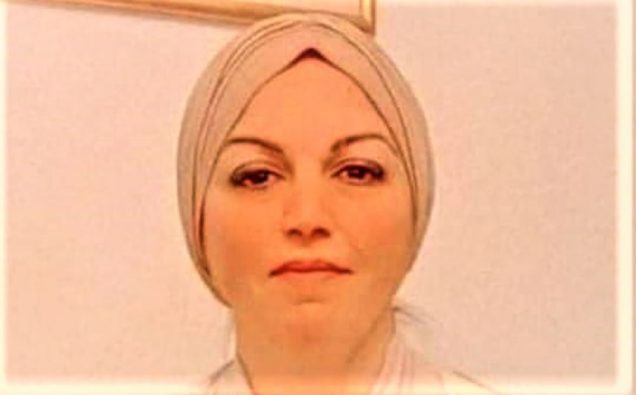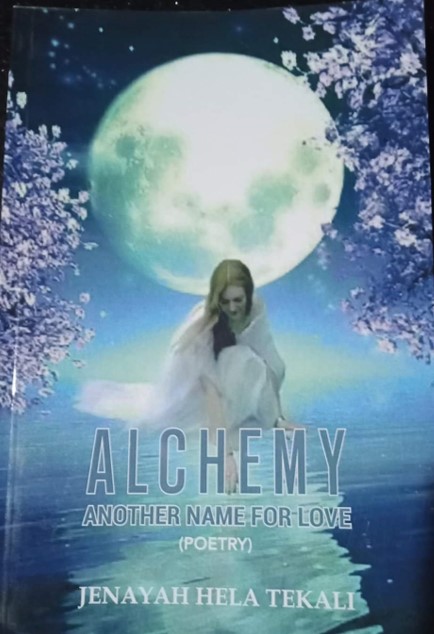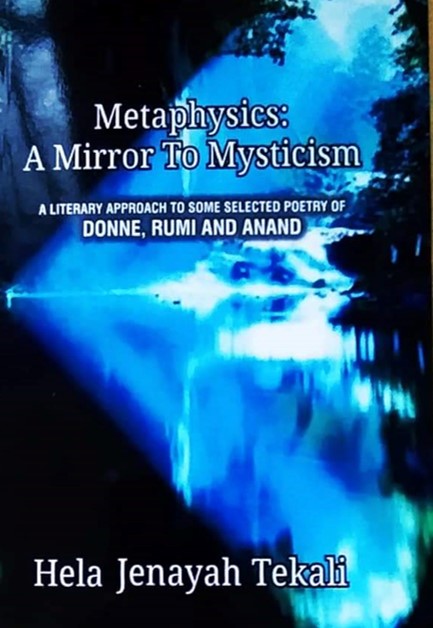
Hela Jenayah Tekali, a Tunisian poet, shares her experiences, feelings, and thoughts with the world in verses in three languages, Arabic, English, and French – a remarkable feat in itself. The overriding trait of her poetry is metaphysical, a huge realm that requires not just an understanding of Islamic Sufism in its aesthetics, cultural and poetic complexities but also an awareness of spiritual quest by followers of other faiths and the spiritualists who do not follow any of the organized religions.
In expressing her experiences, Hela Tekali relies on her strong academic credentials as well as exposure to modern literary trends in the Middle East and Western countries. As evidenced by an array of metaphors and smiles she employs in her poems, Hela Tekali does so in a highly appreciable manner.
For her, poetry and spirituality appear to be two key dimensions of life even in the fast-paced digital era. So, how does she achieve that balance in the two worlds as a citizen when almost everything off and online seeks to sway opinions, and at a time when people have to deal with a torrent of ideas, and conscious and sub-conscious comparisons in an environment of constant psychological and economic struggles irrespective of their socio-economic status? And where does she draw her inspiration from? In an attempt to offer our readers a window into her work, Literature Views and News sought her insight on these and some of the related aspects
LVN: What makes you express spiritual thoughts in poems?
Hela Tekali: Honestly, I do not think that conveying spiritual thoughts in poems is something forced, or intended. On the contrary, it comes spontaneously, and innately as spirituality is something inborn in man. Spirituality is about humanity as it is first and foremost the spirit the main activator that triggers our instinctive impulse, and propels us to see within us as Carl Jung asserts:
“Who looks outside dreams
Who looks inside awakes.”

LVN: We are living in an age when material gains seem to have overpowered all other considerations for a lot of people. So, people wonder where and how to get metaphysical experiences. What is your take?
Hela Tekali: Metaphysics is about experiencing supra consciousness i.e what’s experienced beyond the conscience (that is the spirit level ), as mysticism is the perfecting of a dream where illusion is confounded with reality. In this ever-growing material world we’re living in man is losing faith, and by the same token all the noble features that make him a human, and a soulful being, and he becomes more identified with the homo-sapiens, the artificial intelligence, and robotics than with the humanistic and divine aspects. We are in urgent need to go back to our true origins to seek our true identity and be confined with our ancestors. We are those metaphysical entities experiencing a physical life, we are those guests on earth allowed to soar as visitors with the wings of our mystical words.
LVN: In your poems, we see a lot of references to cosmology, stars, and the universe at large. Tell our readers the significance of wondering about them.
Hela Tekali: I have always believed that physics as a science although mostly based on logical deduction, is not really separated from spirituality. In his book entitled “ Black Holes and Baby universes.” Stephen Hawking propounded that, “Physics is all very well, but it is completely cold.” I couldn’t carry on with my life if only I had physics. Like everyone else, I need warmth, love, and affection .”
As opposed to Hawking, I see the beauty of cosmology within man himself and likewise into stars and planets as inside universes that can be speculated by looking inward. I wrote a poem entitled “ A Telescope Is My Soul ‘’ in which I likened the soul to a telescope where the remote stars can be seen closer by/ thanks to our magnified insight, and the lenses which is our third eye which can make the distance reduced through the magnetic power of the heart that sees beyond the limits and confines of the mind or the self, which are both subservient to the soul which is of higher knowledge and intellect.
I die and rise the same, and soar by your love
I am the Phoenix riddle, the Telescope that lives by your love
I am the Hourglass that holds the sand before my time passes through
I am those Lenses that make your remote Stars appear closer with my magnifying hue.
Love, affection, and warmth that Hawking talked about are to be found within the contemplation of man within himself as it is the case of Abraham the prophet peace be upon him when he observes in Surat Al Anam:
“Then, when the night outspread over him, he beheld a star, and said: ‘This is my Lord.’ But when it went down, he said: ‘I do not love the things that go down.’
And when he saw the moon rising, he said, “This is my lord.” But when it set, he said, “Unless my Lord guides me, I will surely be among the people gone astray.”
Indeed Prophet Abraham speculated about the Moon, the Stars, and the Planet which is quite very telling, and prove the extent to which the prophet was knowledgeable unlike the greatest astronomers like Kepler, Newton, and Copernic, Abraham went beyond the confines of scientific discoveries, and planetary observations, and speculations because knowledge is simply about looking outside while contemplation is about looking inside, it is about awakening, and questioning of faith to which he came to deducing that Allah was beyond mere planets, Moons, and Stars, and all creation itself. Allah was sought within Abraham, for his soul was in itself a black hole, and a baby universe that urges him to venture into its vast ocean, and endless dimensions. The question we can ask now as a response to Hawking. How can man understand and fathom matters of divinity, and his relationship to science if he is driven away from the ‘ sky full of stars’, ‘ galaxies’, ‘ comets’, ‘ stardust’, and ‘ black holes’, while his heart is a complex, spaceship, a multi-dimensional cosmos of divine worship; the truest temple of science and spirituality where all outside speculation has to be sought within and not without.

LVN: Could you tell us something about the journey of the human soul in light of the fact that your poetry has often touched on metaphors and spiritual connections?
Hela Tekali: The journey of the human soul is the most difficult quest of every human being seeking truth since the self is roaming on earth, and embarking on a never-ending journey not bereft of darkness, however, it appears that lack of hope and a great amount of despair seem to accompany every innocent soul through the unbearable trials on earth, but the soul should persevere, and withstand pitch darkness in order to reach the supreme light as I put it perfectly in one of my quotes:
“You lead me to places I have never been before, to the boundaries of darkness where from Light begins” echoing Albert Camus’ saying: “There is no sun without shadow, and it is essential to know the night.”
LVN: Could poetry be a vehicle or a platform to unite people in this era of endless conflicts?
Hela Tekali: Of course. Poetry is doubtlessly a vehicle towards fraternity, and brotherhood as it allows the spreading of compassion, unconditional love, empathy, and emancipation from ego, vanity, contempt, egocentrism, and enmity, .It is an epitome of beauty, altruism, selflessness, generosity, and humility, and as I wrote in one of my recent poems:
Humanity is born out of the poet’s heart
It grows then dies under the politicians’ eyes
Friendship and love are the best values of Art
Thanks to their virtues even the dry ink flies.
Let us raise our silent voice
Make it our best choice
We need to spread ambition
And plant the seeds of compassion.
We are all poets united despite our creed
With the wisdom of words your spirits we feed
Let us gather together to bolster this noble mission
Be the pioneers of a new generation that calls for fraternal tuition.
Hela Tekali
I, therefore, think that poetry has a noble mission which is to bolster unconditional love worldwide and act as a pioneer of a new generation that calls for fraternal tuition.
LVN: You have studied writers from different parts of the world who have been the greatest influences on the development of your thoughts and experiences as a poet.
Hela Tekali: I do not think that poetry is an outcome of an outer influence, but rather an inner introspection. However many writers have inspired my ink to some extent and propelled me to see more into the beauty of poetic expressions such as William Wordsworth, William Blake, Robert Frost, Walt Whitman, Rumi, Gibran Khalil, Ralph Waldo Emerson, Ernest Hemingway, and many others.
I have been influenced by Wordsworth’s the Table Turned, as I saw into nature and not necessarily Pantheism i.e the spirituality of nature, but the beauty of monotheism, and transcendence a living soul with a heart that’ watches and receives’ beyond All science and All Art what the Silence of Allah can bestow upon us. William Blake by the same token claims that :
”Art is the tree of life
Science is the tree of death.”
I likewise gained from Rumi and his Sufi teachings that true religion is love, and every heart is my temple, and as I said in one of my quotes:
“Between humanity and religion, there is the diction of love that has for its sacred temple the heart.”













